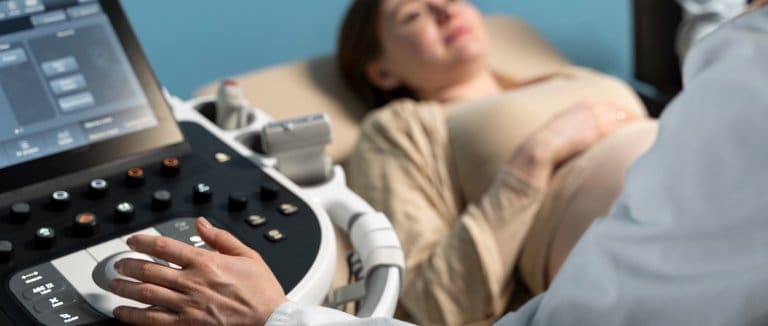Chemical Pregnancy: Causes, Symptoms, and Next Steps
A chemical pregnancy is an early type of pregnancy loss that occurs when a pregnancy test initially shows positive results, but the embryo does not successfully implant in the uterus and the pregnancy ends very early. Most of the time, a it does not signal any serious underlying health problem. However, it's still important to see your doctor for check-ups and proper evaluation. To learn more about the causes, symptoms, and next steps, continue reading this article.

What is a Chemical Pregnancy?
A chemical pregnancy is an early pregnancy loss that occurs before the embryo properly implants in the uterus, usually within the first five weeks. Fertilization takes place, which can result in a positive pregnancy test. However, because the embryo does not successfully attach, the pregnancy ends very early and often goes unnoticed, with the embryo being naturally expelled.
What Are the Symptoms of Chemical Pregnancy?
Chemical pregnancies often go unnoticed or end with mild symptoms. The symptoms of a chemical pregnancy may include:
- Menstrual Delay: In biochemical pregnancy, the menstrual cycle may occur at a different time than usual. Women may experience menstrual periods that are delayed due to pregnancy and occur after the miscarriage.
- Light Bleeding: Due to the embryo's failure to implant in the uterus, there may be light bleeding.
- Mild Cramps: Mild cramps may occur due to changes in the uterus.
- Emotional Changes: Emotional fluctuations and mild mood changes may be among the symptoms of biochemical pregnancy.
- Changes in Pregnancy Test Positivity: In biochemical pregnancy, a positive result on a pregnancy test may occur due to fertilization. However, since the pregnancy ends early, pregnancy symptoms may not be very pronounced. When tested again after a while, the result may turn negative due to chemical pregnancy.
- Low Beta hCG Levels: During a biochemical pregnancy, low levels of beta hCG (human chorionic gonadotropin) in the bloodstream can be detected in the early stages of pregnancy.
Why Does Chemical Pregnancy Occur?

Chemical pregnancies can occur due to various reasons. Possible causes of biochemical pregnancy include:
- Genetic Abnormalities: If the embryo is not viable for healthy development, it may fail to implant in the uterus, leading to the termination of pregnancy.
- Implantation Problems: Biochemical pregnancy can occur if the fertilized egg encounters difficulties in implanting into the uterus. The quality of uterine tissues or irregularities in the uterine lining can negatively affect the implantation process.
- Hormonal Imbalances: Malfunctioning of the hormones necessary for pregnancy can prevent the pregnancy from being sustained. Adequate levels of progesterone, in particular, are essential for the uterus to accept and sustain the fertilized egg during pregnancy.
- Uterine Anomalies: Some women may have congenital uterine anomalies. Abnormalities in the shape of the uterus can make it difficult for the embryo to implant and for a healthy pregnancy to develop.
- Immune System Response: Women's immune systems may perceive the fertilized egg as a foreign object and react to prevent the embryo from implanting into the uterus.
- Age Factor: Women's ages can also influence the risk of it. Particularly in advanced age, ovarian reserve may decrease, and the quality of eggs may decline.
- Tubal Blockages: Blocked fallopian tubes can prevent the fertilized egg from reaching the uterus, increasing the risk of biochemical pregnancy.
- Stress and Environmental Factors: Intense stress, irregular nutrition, smoking, alcohol consumption, and other environmental factors can increase the risk of chemical pregnancy.
- Polycystic Ovary Syndrome (PCOS): PCOS is a condition where the ovaries function irregularly, which can affect ovulation negatively."
How Does Chemical Pregnancy Occur?
A chemical pregnancy begins when an egg is fertilized by sperm in the ovary, forming a zygote. The zygote then divides and grows as it moves through the fallopian tube toward the uterus”a journey that usually takes 3 to 4 days. The next critical phase is implantation, when the embryo tries to attach to the uterine wall and the uterine tissue prepares to nourish it. If implantation occurs, the embryo starts producing the pregnancy hormone hCG, which is what pregnancy tests detect.
A chemical pregnancy occurs when a pregnancy test shows a positive result due to increased hCG levels, but the embryo does not successfully implant in the uterus or stops developing at a very early stage. This early pregnancy loss often happens before a woman notices typical pregnancy symptoms. The embryo is then naturally expelled, sometimes causing mild bleeding and cramps. As a result, menstrual periods may be delayed or slightly different from normal, often followed by what appears to be a regular period or early miscarriage.

What Are the Recommendations for Those Who Experience Chemical Pregnancy?
In most cases, a chemical pregnancy does not point to a serious underlying health issue and will not affect future fertility or pregnancies. However, every woman's situation is different. If you experience a chemical pregnancy, it's a good idea to consult a gynecologist to discuss possible causes and get personalized recommendations for your reproductive health.Some recommendations that may help ease the process after a it include:
- Talking to close friends, family members, or a psychiatric specialist can be helpful.
- Consulting with a gynecologist or reproductive health specialist is necessary.
- Trying stress management techniques such as yoga, meditation, breathing exercises, and hobbies may be beneficial.
- For women who experience multiple chemical pregnancies, doctors may suggest appropriate treatment options.
- Doctors may recommend hormone supplements such as progesterone for women who experience chemical pregnancy.
- Genetic tests may be performed for women who experience multiple chemical pregnancies. These tests aim to check for genetic abnormalities and prevent recurrent pregnancy losses.
- Women who experience chemical pregnancy should check with their doctors if any prescribed medication has negative effects on pregnancy.
How is Chemical Pregnancy Diagnosed?
Chemical pregnancy can be diagnosed if a positive pregnancy test is followed by an early miscarriage, usually before other pregnancy symptoms develop. If a woman tests positive for pregnancy, then experiences delayed menstruation followed by bleeding, repeating the test may show a negative result. In these cases, a gynecologist can confirm a chemical pregnancy through careful review and supervision.
* Liv Hospital Editorial Board has contributed to the publication of this content .
* Contents of this page is for informational purposes only. Please consult your doctor for diagnosis and treatment. The content of this page does not include information on medicinal health care at Liv Hospital .
For more information about our academic and training initiatives, visit Liv Hospital Academy
Frequently Asked Questions
What is a chemical pregnancy?
A chemical pregnancy is an early pregnancy loss that occurs shortly after fertilization when the embryo fails to implant in the uterus.
How soon does a chemical pregnancy happen?
It usually occurs within the first five weeks of pregnancy, often before a woman realizes she is pregnant.
Can a chemical pregnancy show a positive test?
Yes. The pregnancy test detects the hCG hormone, but when the pregnancy ends early, hCG levels drop and later tests turn negative.
What causes a chemical pregnancy?
Common causes include genetic abnormalities, hormonal imbalances, implantation problems, and uterine anomalies.
Does a chemical pregnancy affect future fertility?
In most cases, it does not impact future fertility or the ability to conceive again.
Can stress cause a chemical pregnancy?
While stress alone doesn’t directly cause it, chronic stress can influence hormonal balance, increasing the risk of early miscarriage.
Do I need treatment after a chemical pregnancy?
Usually, treatment is not required, but if it happens repeatedly, your doctor may recommend hormone or genetic testing.
How can I prevent a chemical pregnancy?
Maintaining a healthy lifestyle, managing stress, and addressing hormonal or uterine issues can reduce the risk.
When can I try to get pregnant again?
Women can generally try to conceive again after one normal menstrual cycle unless otherwise advised by a doctor.
Why choose Liv Hospital for care after a chemical pregnancy?
Liv Hospital offers advanced reproductive health evaluations and personalized care plans to support women’s fertility and emotional well-being.


